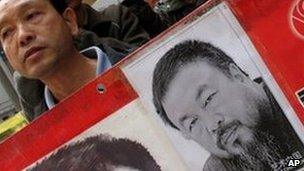China artist's arrest is wider warning
- Published

Ai Weiwei has angered Chinese authorities with his views on human rights and reform
The Chinese authorities are taking every measure to ensure what they call "social harmony", even if it means arresting high-profile artist Ai Weiwei and sparking international condemnation.
It is a political calculation and in the world's second largest economy, politics still come first.
Officials have now confirmed that Ai Weiwei is under investigation for "suspected economic crimes", four days after he was detained at Beijing airport.
It would appear that the authorities are digging in their heels.
Ai Weiwei has been a thorn in Beijing's side as he investigated the collapse of shoddy school buildings in the Sichuan earthquake and led demonstrations in Beijing over the demolition of an artists' village.
He also attempted to support dissidents at their trials and denounced the government for its angry reaction to detained dissident Dr Liu Xiaobo's Nobel Peace Prize.
The authorities resorted to tactics like demolishing his studio in Shanghai. But the fierce government critic did not heed their warning.
Now the authorities have obviously changed tack, accusing him of economic wrongdoing.
Sending a message
As an editorial in the official Global Times admitted, there is a lack of experience on the part of the authorities in dealing with what they called a "maverick" character like Ai Weiwei, because of his international profile and his family connection with the founding fathers of the People's Republic.
But his mother, Gao Ying, says she does not believe he has been arrested for economic reasons and describes the investigation as an excuse to silence him.
China's security apparatus has certainly been busy over the past few months cracking down on dissent after online calls for a "Jasmine Revolution" in Chinese cities on Sundays, as authoritarian leaders were toppled in North Africa and the Middle East.
Nervous of a similar movement across the country, Chinese authorities have arrested and charged quite a number of dissidents and put many more under virtual house arrest. Still dissent persists.
There is a well-known Chinese phrase: "Slaughter a chicken to warn the monkeys."
By detaining a very prominent critic and defying international calls for his immediate release, the authorities seem to be sending out a message that they are prepared even to deal with a powerful and valuable "monkey", let alone the smaller "chickens".
But pressure alone will not produce a solution to China's social problems and stop political activism. Just the contrary.
- Published20 July 2012
- Published5 April 2011
- Published22 November 2010
- Published4 April 2011
- Published12 January 2011
- Published8 November 2010
- Published6 November 2010